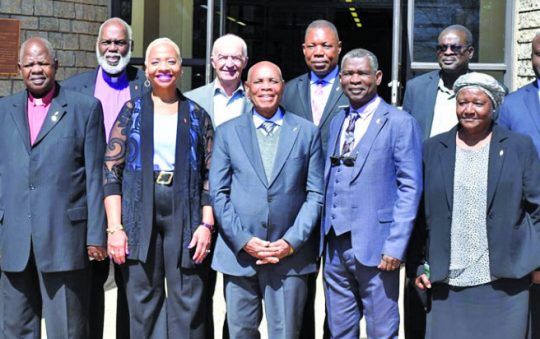
Late breaking news. Voting for the nation’s next president has been called off for now. Thanks for coming. Stay tuned for further announcements.
Not the kind of message one would expect from the superpower of Africa.
But indeed, five hours before polls were set to open on Saturday, Nigeria’s electoral commission announced that unspecified “challenges” had forced a “difficult decision.” Voting materials had not been delivered to all parts of the country and the much-anticipated elections would be postponed for a week. Maybe.
“This was a difficult decision but necessary for the successful delivery of the elections and the consolidation of our democracy,” said commission chair Mahmood Yakubu, speaking to reporters late Friday night.
President Muhammadu Buhari , having just left the mosque in his hometown Daura, wanted no part of the drama and was not going to appear as if he had been forewarned. “I have given the military and the police instructions to be ruthless. We are not going to be blamed for the bad conduct of the election,” he told senior members of his All Progressives Congress (APC).
Anyone trying to intimidate voters or interfere with the voting “will do it at the expense of his own life”, he warned.
The opposition People’s Democratic Party (PDP) has suggested that Buhari, a former military ruler who was later elected president in 2015, was behind the postponement in order to hold on to power.
The PDP criticized the president’s comments. “President Buhari’s threat to the lives of Nigerians… is a direct call for jungle justice,” the party said in a statement.
Buhari faces a tight contest against the PDP’s Atiku Abubakar to lead a country that has Africa’s largest economy and is its top oil producer but is plagued by corruption and wide gaps between rich and poor.
On Friday, planes leaving Abuja airport were full of people going home in order to take part in the election. On Election Day, travel is restricted, and most people walk to polling stations to cast their votes.
Elections for the state governors, due to be held on March 2, were also delayed by a week. The cost of the election, already expected to be 242 billion naira ($670m) will now increase.
For Fisayo Soyombo, the biggest threat to the voting exercise is a low turnout. Of the 14.28 million new voters who registered for this year’s election, only 76 percent picked up their voter cards as of the Feb. 9 deadline. Many Nigerians who live far from where they are registered will also find it a challenge as the current law does not allow them to vote at any other location.
“But most importantly, Nigeria’s election dates need sacrosanctity,” Soyombo said. “In the U.S., for example, Election Day is set by law to the first Tuesday after the first Monday in November. So the next US presidential vote is already scheduled for Nov. 3, 2020, granting enough time for preparation and ensuring voter confidence in the electoral system.
“It would be great if Nigeria achieves that by 2023.”






